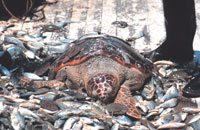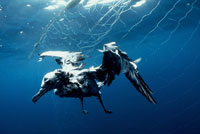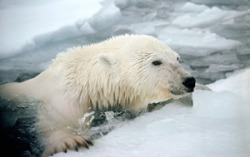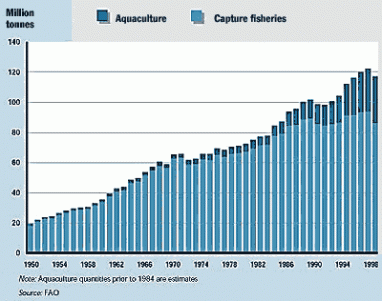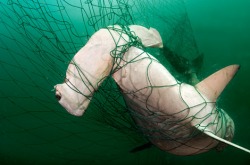Bykill
Bykill is the marine life that swim into fishing nets but are not the fish that are being hunted, so they are thrown back into the ocean. Bykill is a negative product of overfishing. Most fishermen use fishing nets when they are fishing for a large number of fish. Sometimes fishermen want a certain kind of fish that is in high demand at the time, tuna for example. When they send down the fishing nets, they hope to catch tuna, but the nets catch millions of fish at a time. The odds are that not all of the fish will be tuna, and when this happens, fishermen just keep what they want and throw back what they don 't want. The fish thrown back in are usually either dead or dying.
It's Personal
If we keep fishing these enormous amounts of fish, then eventually the ocean will run out of fish. When that happens, the billions of people that rely on fishing for jobs will be out of work and those who rely on it for food will starve. Without fishing to support jobs, our economy will suffer. Many countries use fish as their main export; if those countries have no fish to give us for our goods, their economy will go downhill. Fish is a main part of several nation's diets and for good reason. Fish is a good source of protein with only a little bit of fat and cholesterol. Fish also provides Omega 3 which is good for heart health and is the good kind of fat that keeps your body strong. It's hard to find alll of those nutrients elsewhere. Overfishing affects everyone.
The Food Chain
How overfishing affects other animals
Humans aren't the only things that eat fish, animals do also. There are many predators in the ocean and on land that need fish to survive. Even though humans can adapt to not eating fish, will animals be able to? The food chain is a powerful thing, and we may be at the top of it, but that only means that we'll get hit later and harder. We could eat other types of meat instead of fish, but animals don't have much of an option. Once the animals that relied on fish for food run out of other prey, they 're going to die. That would leave us with no more animals. Take big eye tuna for an example. It will be extinct in 3-5 years if we keep fishing it like we are now. Also, think about what fish eat. Once fish are gone, all of their prey will be extremely abundant and things such as algae and other plants will fill up the oceans. In a few hundred years the entire animal kingdom could be wiped out because of overfishing.
Oceanic Climate & Fishing Techniques
Overfishing hurts the ocean's climate. Taking a lot of fish of one certain type throws off the ocean's chemistry. The prey of the fish being fished multiplies because there are limited amounts of predators. This messes up the food chain as bottom-of-the-food-chain fish increase and top-of-the-food-chain fish decrease.
When trawlers use a technique called bottom trawling they lay a net down on the ocean floor and drag it across. This damages the ocean floor. Also, animals not meant to be caught in the nets become tangled and sometimes die. Drift nets are huge nets that can cover kilometers of ocean. Whole schools can be caught in a single drift net. Longline fishing consists of baited hooks strung on lines that can be up to 80 miles long. Birds are often caught by the hooks. Fishermen use huge boats called trawlers to catch these huge amounts of fish. Also, many fish species have declined 90% in the past 40-50 years.
When trawlers use a technique called bottom trawling they lay a net down on the ocean floor and drag it across. This damages the ocean floor. Also, animals not meant to be caught in the nets become tangled and sometimes die. Drift nets are huge nets that can cover kilometers of ocean. Whole schools can be caught in a single drift net. Longline fishing consists of baited hooks strung on lines that can be up to 80 miles long. Birds are often caught by the hooks. Fishermen use huge boats called trawlers to catch these huge amounts of fish. Also, many fish species have declined 90% in the past 40-50 years.
